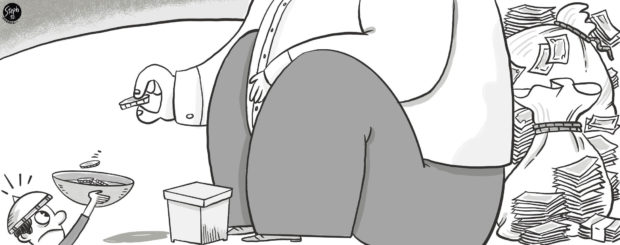Killing Bayanihan
After Sen. Francis Pangilinan first disclosed that P18.4 billion remained unspent after the Bayanihan 2 law lapsed on June 30, it turned out that an even bigger amount — P173 billion — that had been allocated for critical programs meant to combat the crippling effects of the COVID-19 pandemic on the people and the economy had not been used.
Citing records from the Department of Budget and Management (DBM) and budget trackers, Pangilinan earlier identified vital COVID-19 response programs left hanging with the lapse of the second Bayanihan law: the hiring of health workers and contact tracers, laboratory testing, service contracts for public transport workers, subsidies for students and formal and informal workers, and cash aid for the poor, among others.
Article continues after this advertisementAn Inquirer report based on DBM records, meanwhile, said that as of June 25, some P168.7 billion in approved COVID-19-related funds remained unused. This is a big chunk of the P665.7 billion total releases to departments and agencies to finance various COVID-19 responses since the start of the pandemic in March 2020.
Per the DBM, P47.6 billion from the first Bayanihan to Heal as One Act (Bayanihan 1), passed in March 2020, plus additional COVID-19 allocations from the national budget, remained unspent a year after Bayanihan 1 had lapsed. Under this law, P387.2 billion were allocated, but the actual disbursements amounted to P345.9 billion.
Under the Bayanihan to Recover as One Act (Bayanihan 2), passed in September 2020, allotment releases reached P205.1 billion. But as of June 25, only P141.4 billion had been spent when the law lapsed on June 30, leaving a balance of P63.7 billion which reverted to the treasury.
Article continues after this advertisementThe P4.51-trillion 2021 national budget also allocates P66.9 billion for pandemic programs, and only P9.63 billion of this has been used, leaving a balance of over P57 billion. Unlike the expired funds of the two Bayanihan laws, the amount could still be used for the rest of the year.
How did so much money intended for immediate pandemic relief end up unused? The unexpended funds represent the height of dereliction of duty for a government that, in the middle of a catastrophic crisis and after allocating money including from huge foreign borrowings, would then allow billions of that fund to be held up. The lapse of the law practically turned off the faucet for a weary citizenry awaiting sufficient support to recover their jobs, jumpstart their businesses, and heal the sick.
What excuses do government agencies have for being slow in the disbursement of the allocations when the Bayanihan 1 and 2 laws were passed expressly to “authorize the President to exercise powers necessary to carry out urgent measures to meet the current national emergency related to COVID-19,’’ including the power to “reallocate, realign and reprogram’’ budgets?
The Bayahinan 2 law had already been extended from Dec. 19, 2020 to June 30 this year, and yet the funds remained unused and nobody seemed to be on top of the pandemic response to crack the whip on slow-moving programs. While lawmakers had called for another extension of the law, Congress adjourned on June 5 without taking it up, which makes legislative leaders also accountable for this appalling neglect of public interest in a time of great emergency. How hard was it for the Palace and Congress to meet to extend the funding and make sure they were disbursed with dispatch?
Adding insult to injury was the fact that the topnotcher in the non-use of the funds was the very agency supposed to lead the government’s fight against the pandemic—the Department of Health. DBM records show that of the P157.4 billion in allotment releases to the DOH under the Bayanihan 1 and 2 laws and the 2021 budget, the department was able to spend only P51.4 billion. Under Bayanihan 1 alone, some P100 million had been left unspent.
The government’s killing of the Bayanihan law by allowing it to expire was particularly hard for health care workers from state hospitals to take; on the day the law lapsed, they staged a sit-down protest in front of the DOH to demand payment of their unpaid pandemic benefits.
“It is very clear that the DOH and this government have enough funds. But the question is, where are these funds now?,’’ said Robert Mendoza, national president of the Alliance of Health Workers (AHW). “We are seeking justice for all health workers who are neglected and betrayed by the DOH and the Duterte government in this fight against the COVID-19 pandemic. Thus, we strongly demand Secretary (Francisco) Duque to resign from his post.”
That’s like asking for the moon under this administration. Cristy Donguines, president of the Jose Reyes Memorial Medical Center Employees Union-Alliance of Health Workers, could only lament: The “gross incompetence and neglect” of the DOH and the Duterte administration are “too much.”

















